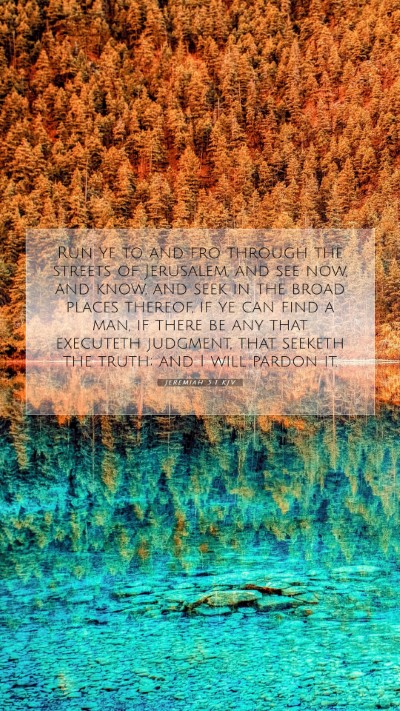Understanding Jeremiah 5:1
Verse: "Run ye to and fro through the streets of Jerusalem, and see now, and know, and seek in the broad places thereof, if ye can find a man, if there be any that executeth judgment, that seeketh the truth; and I will pardon it." (Jeremiah 5:1)
Bible Verse Meanings and Interpretations
This verse from the Book of Jeremiah challenges the people of Jerusalem to witness their own spiritual and moral decay. The message is both urgent and profound, calling attention to the absence of justice and truth in the city. Here are several insights derived from public domain commentaries:
Matthew Henry's Commentary Insights
Matthew Henry emphasizes the severe state of corruption in Jerusalem. He notes that God commands Jeremiah to search the city to find any individual who practices justice and seeks the truth. The absence of such individuals indicates a complete moral failure among the people. Henry points out that this quest signifies God’s willingness to forgive if only one righteous person can be found, illustrating divine mercy amidst impending judgment.
Albert Barnes' Commentary Perspectives
Albert Barnes elaborates on the notion of “running to and fro.” He interprets this as a call to thoroughly investigate the city, highlighting the accountability of the people of Jerusalem for their moral state. Barnes underscores the significance of “executing judgment” and “seeking the truth,” which speaks to the core of righteous living and social justice. He draws parallels to the lack of these virtues in the society of Jeremiah’s time with current contexts, encouraging readers to reflect on their own circumstances.
Adam Clarke's Commentary Analysis
Adam Clarke provides a detailed exegesis of the passage, noting the dire implications of the search. He mentions that the phrase “broad places” refers to public spaces where societal behaviors are visible. Clarke highlights the futility of the search, as the absence of even a single righteous person exemplifies the depth of moral corruption in Israel. He craves the reader's awareness of the importance of finding truth and righteousness as pillars of a flourishing society.
Key Themes and Reflections
- The Urgency of Seeking Righteousness: This verse calls each individual to actively seek justice and truth in their surroundings.
- Divine Mercy and Judgment: The willingness of God to pardon indicates His mercy, but it also lays bare the consequences of widespread sin.
- Societal Reflection: The call to look for one righteous person serves as a mirror for societies today to examine their own moral conditions.
- Accountability: The quest for righteousness emphasizes that both personal and communal accountability is necessary for a society to thrive.
Applying Jeremiah 5:1 Today
In today's context, Jeremiah 5:1 invites individuals and communities to evaluate their ethical and spiritual standings. It encourages believers and Bible study groups to engage in deeper theological discussions regarding the significance of justice, truth-seeking, and accountability in contemporary society. Utilizing online Bible study resources and tools can enhance understanding and application of such profound messages.
Cross References
- Genesis 18:23-24: Abraham’s plea for the righteous in Sodom.
- Ezekiel 22:30: God seeks for someone to stand in the gap for the land.
- Romans 3:10: "There is none righteous, no, not one."
Conclusion
Jeremiah 5:1 serves as a profound reminder of the challenges of maintaining justice and truth in a fallen world. The verse invites intensive study and reflection, facilitating a deeper understanding of the themes of righteousness and accountability. Bible study groups can utilize this verse to encourage communal discussions about personal responsibilities in the pursuit of justice, both in individual lives and the wider society.
Additional Study Resources
For anyone interested in further exploring the meanings and implications of scripture, consider utilizing various Bible study tools, including:
- Bible study guides: These can provide structured approaches to understanding difficult passages.
- Bible study lessons: Engaging lessons can enhance group discussions, helping to interpret and apply scripture.
- Online Bible study: Virtual platforms can foster discussion and learning among diverse groups.
Ultimately, the insights gathered from this verse and its commentaries can enrich personal faith journeys, encouraging a commitment to seek truth and justice in all aspects of life.


